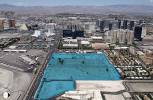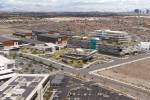UNLV hopes to tap more revenue sources for proposed stadium
UNLV stadium boosters have long stressed that an on-campus tax district would carry the weight of financing a proposed 60,000-seat sports and entertainment venue, but they now say they're concerned that this funding source might not be enough.
Additional funding sources under discussion include a new fee on rental of each hotel room across the Las Vegas Valley, officials at the University of Nevada, Las Vegas, confirmed late Monday.
"We have to plan for the contingency of what if the tax increment district doesn't provide adequate funds," said Don Snyder, dean of UNLV's hotel administration college and the university's point man on the stadium.
Until now, the university and its private-industry partner had said the tax district, which would capture taxes on the sale of food, beverages and retail items at a proposed shopping area to be built as part of the UNLVNow stadium project, would pay much of the construction bill.
The financing plan remains in flux in part because the exact budget for the stadium is still unknown. UNLV officials are finalizing the "all-in" building cost for the proposed "Mega-Event Center." A University of Michigan consultant estimated the project at $800 million to $900 million.
UNLV is awaiting information from the Federal Aviation Administration to finalize the project cost in light of the stadium's proximity to McCarran International Airport. That information will determine the stadium's height and help UNLV finalize the project cost.
Both a campus taxing district and a new hotel room fee would have to be approved by the state Legislature, which starts its biennial session next week.
The university has talked with state Assembly Speaker Marilyn Kirkpatrick about the proposed tax district on campus, but no other funding initiatives have been discussed with any state lawmakers, Snyder said.
While confirming that the room fee is under consideration, Snyder said it has not been floated with lawmakers and is one of several options for a broader revenue source that would tap revenues from the public and private sectors.
Room fees - or tourist taxes - are common for funding stadiums.
Las Vegas hotels already must charge an average of 12 percent per room-night in taxes that support state and local governments.
When asked about an additional fee on hotel rooms, the Las Vegas Convention and Visitors Authority issued a statement: "As we and other stakeholders have previously stated, we understand the important role UNLV plays in the community and the potential of the project. The concept has generated interest, but there are more questions than information at this stage, including funding sources."
UNLV's potential funding sources include straight donations, Snyder said. Stadium boosters had already said they would like the Las Vegas gaming and hotel industry to donate $125 million for the stadium project.
UNLV is partnering with Majestic Realty on the stadium project. Majestic's point man - Craig Cavileer, president of the Silverton hotel and casino - declined to comment.
UNLV needs to tie up a deal with Majestic over stadium financing and revenues because the university wants to discuss the agreement with the Board of Regents at a work session Feb. 22, followed by a regents vote on the project at a Feb. 28 meeting.
Contact reporter Alan Snel at asnel@reviewjournal.com or 702-387-5273.























